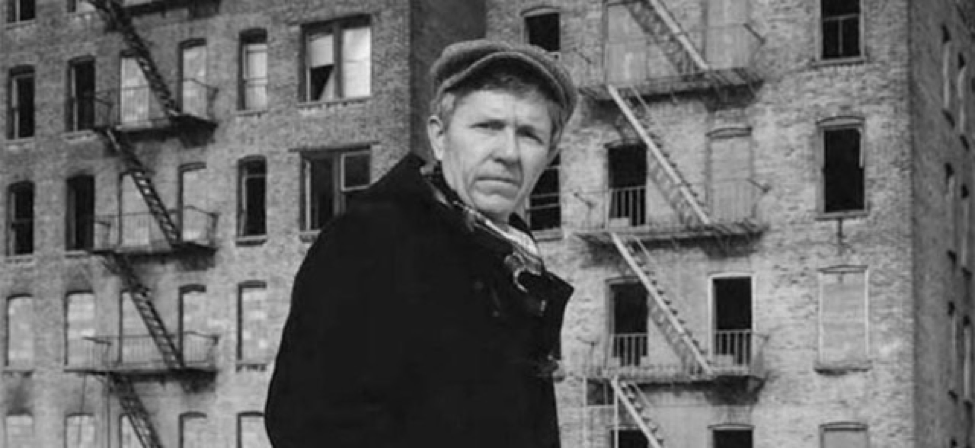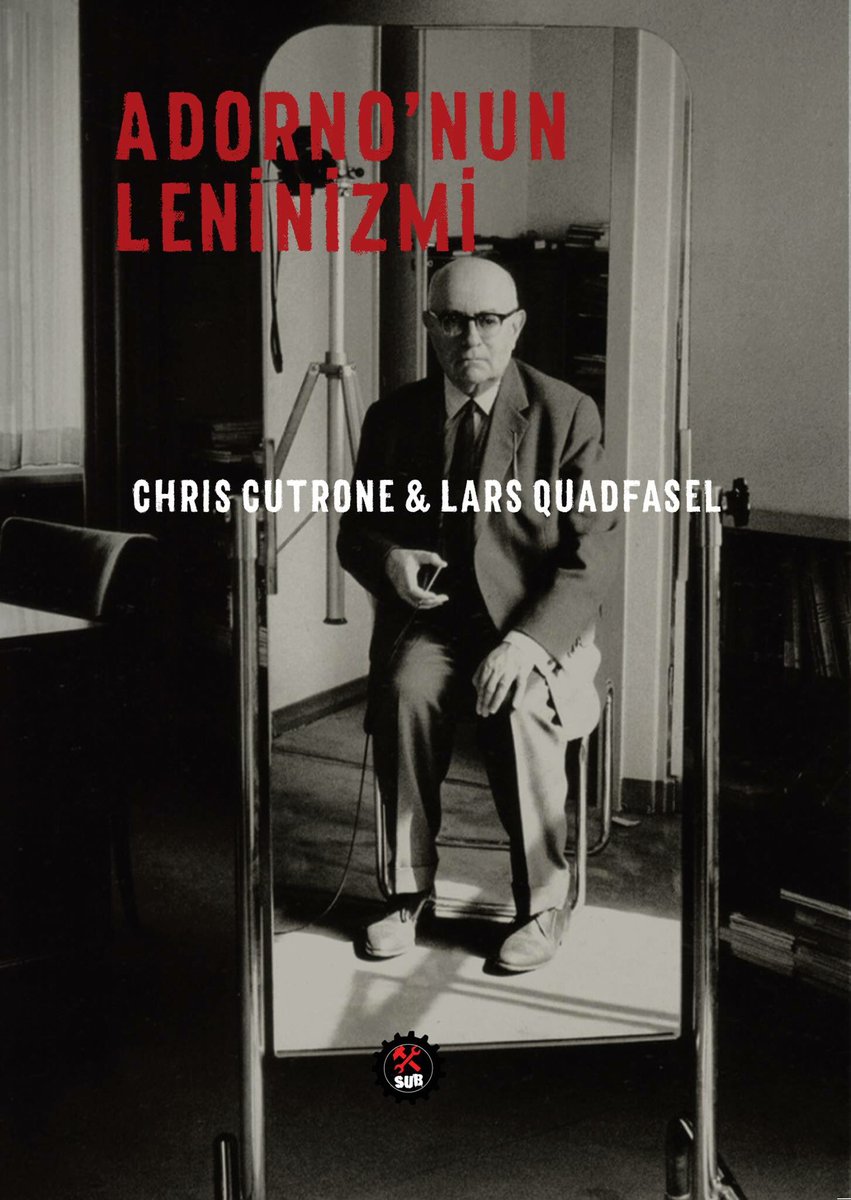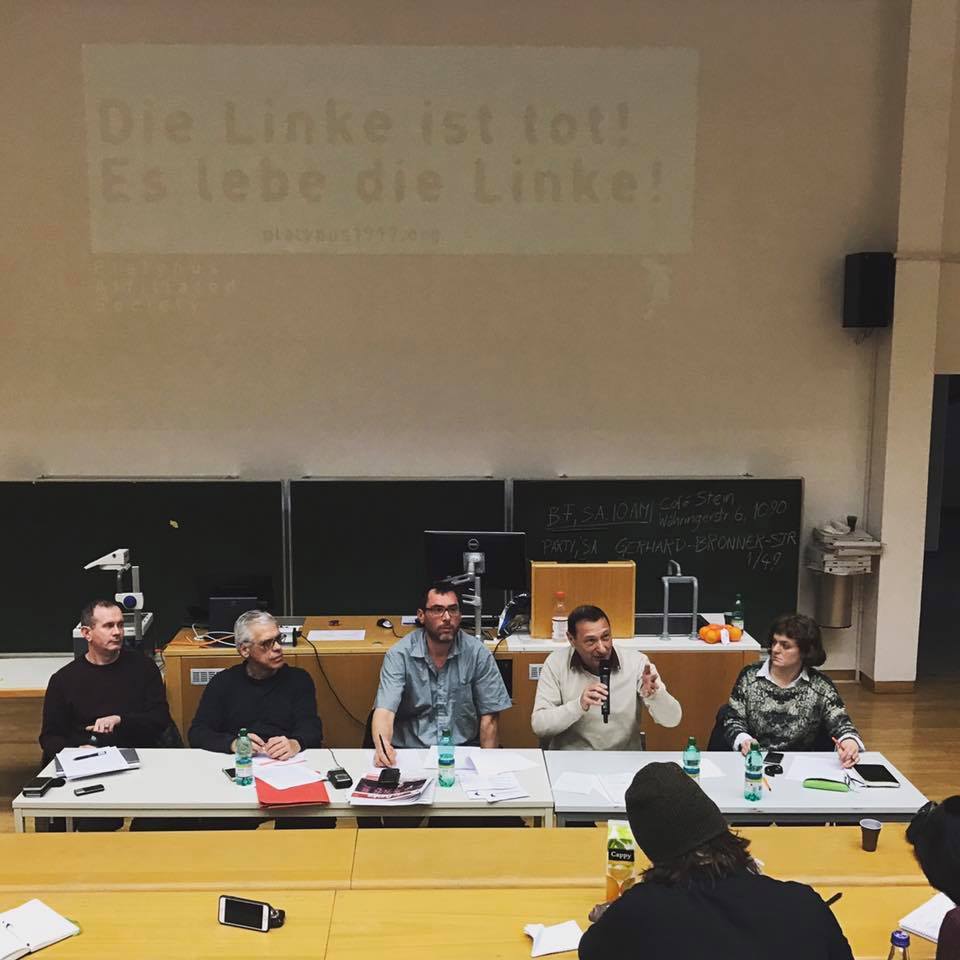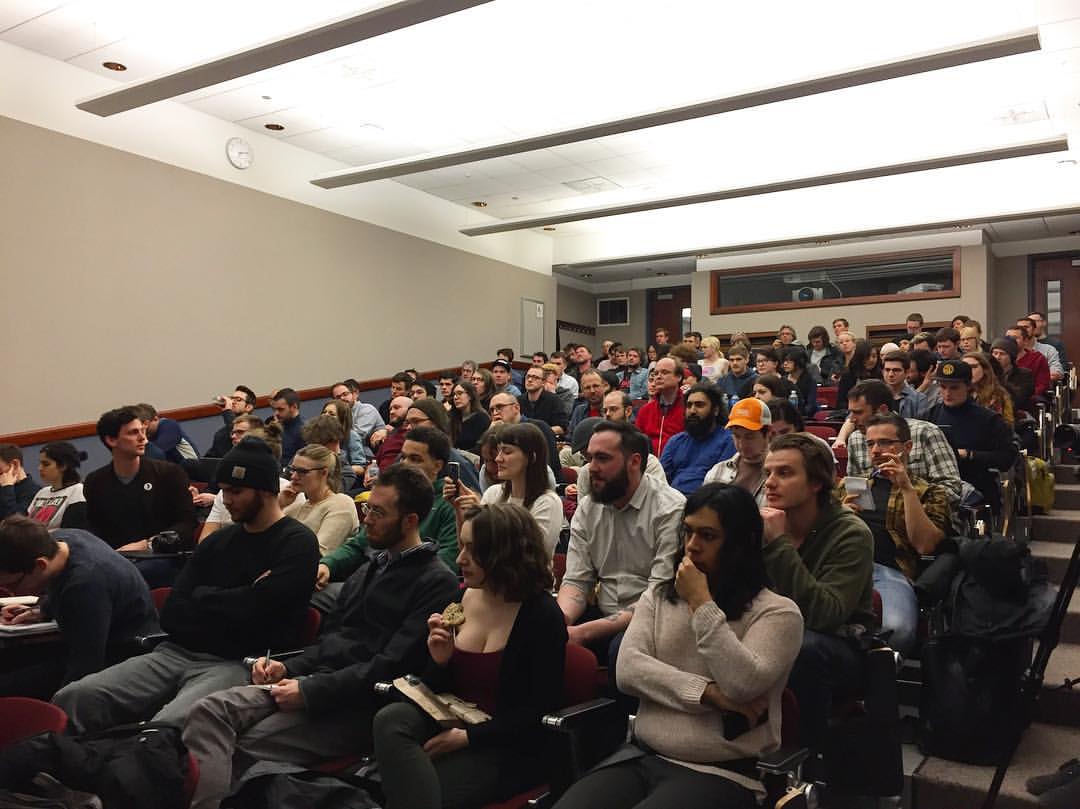Reading and discussion broadcast on Radical Minds, WHPK radio, Chicago:
Platypus Review 102 | December 2017 – January 2018
THE ACCOUNT OF HISTORY is the theory of the present: How did we get here; and what tasks remain from the past — that however appear to be “new” today? As Adorno put it, “the new is the old in distress.”[1] This is true of capitalism and its crisis now.
The present crisis is a crisis of the world system of capitalism that emerged in the 20th century, a crisis of the capitalist world created by the Second Industrial Revolution at the end of the 19th century — in fits and starts (such as the two World Wars and the Cold War) but nonetheless consistently and inexorably. That system has been led by the countries newly industrialized at the end of the 19th century, the U.S., Germany and Japan. All three have come to be in crisis in the early 21st century — the crisis of the EU can be regarded as a crisis of the management of “German” capital.
David Harvey, in his book The Condition of Postmodernity (1990), written and published in the heyday of neoliberalism, regarded the history of capitalism as a succession of “regimes of accumulation” — concrete forms for socially and politically mediating the need to accumulate capital in its valorization process. But since, according to Marxism, capitalism is itself a form of social contradiction and thus a crisis and decay of society and politics, each successive form of capitalism takes up and perpetuates the crisis of the preceding form, however in an altered way.[2] Capitalism really is a matter of “kicking the can down the road,” apparently indefinitely. But the banging can eventually returns, and we must ultimately pay the added costs of its deferral.
The characterization by critical contemporaries of the late-19th – early-20th century era as the “Gilded Age”[3] expressed its quality as what Kant warned about a century earlier, in his 1784 essay on the “Idea for a Universal History from a Cosmopolitan Point of View,” namely, “the danger that the vitality of mankind may go to sleep:” “Everything good that is not based on a morally good disposition, however, is nothing but pretense and glittering misery.”[4] Gilded Age capitalism was such “glittering misery.” This quality of capitalism continues today, especially in the last generation of neoliberalism whose spell was broken in the recent crisis. Joseph Schumpeter tried to put a happy face on capitalism by calling it “creative destruction,” but Marxism recognized to the contrary that it is actually destructive creation.[5] And its destructiveness is not only immediate but has long-term consequences. The destruction of capitalism is cumulative: it makes claims on future generations that cannot be settled cheaply.[6]
Industrial production and Robber Barons
It was during the period of the late 19th century Gilded Age that capitalists appeared not as entrepreneurs of production but as “Robber Barons” — an aristocracy of looting. Marx had already mordantly observed that in industrial production, with its high capital requirements, it was not the case that being a captain of industry made you money, but rather that having money made you a captain of industry. In industrial capitalism, it was not, as Adam Smith had thought, production developed by reinvestment of relatively low profits in the long run, with high wages facilitating increased consumption — wealth — in a virtuous cycle, but rather, as Marginal Utility Theory, developed precisely in this late 19th century era, regarded more cynically, that use-values of commodities decrease over time, so investors in their production better get in early and take their profits out while the going is still good and before it becomes a matter of diminishing returns — the miserable reasoning of what Smith regarded as “mercantile interest,” the profiteering of “buying cheap and selling dear,” that he thought actually constrains and undermines the productivity of wealth in society, and so needed to be overcome as an impediment to growth. Marx pursued rather the self-contradiction in what became of Smith’s labor theory of value in industrial capitalism.
The accelerated technical production of the Industrial Revolution increased along with it the accumulation and concentration of capital, which Marx thought produced a crisis of value in industrial capitalism, in that such production was still socially mediated by the value of wage-labor, however anachronistically. Wage labor was inadequate for the social appropriation of industrial production. This was the self-contradiction of the capitalist mode of production in political-economic terms, according to Marx: the “bourgeois social relations” were contradicted by the “industrial forces of production;” industrial technique served to increase capital but this outstripped the actual social productivity of human labor, eliminating workers from production so that, as Max Horkheimer wryly observed, “machines have made not work but the workers superfluous.”[7] Adam Smith’s “proprietors of stock” were only a slight variation on the prior traveling merchants collecting the products of cottage industry, now gathering the previously disparate producers in factories; they were not capitalists in the Marxist sense of “owners of the means of production:” the role of the proprietors in Smith’s view of production was minimal by comparison to the laborers who were actually making things with increased efficiency. Where Smith would have expected higher productivity to result in the increased value of time in work through cooperation that would not only increase the purchasing power of labor but also decrease labor-time and increase leisure-time, what happened for labor instead, at a societal level, was the pernicious combination of over-work and unemployment, not attributable merely to temporary labor-market corrections. Human labor was progressively eliminated from production in absolute and not only relative terms: increased production was no longer based primarily on human labor-power inputs in efficient cooperation (as in Adam Smith’s example of the pin-factory), but rather on the development of science and technology, or what Marx called the “general social intellect,” objectified in machine production.
The “combined and uneven [i.e. self-contradictory] development” of capitalism is exhibited by the paradoxical phenomena of simultaneously coexisting “robots and sweatshops.” Industrial development and the accumulation of capital undermine the entire bourgeois social ethos of rewarding productivity through work, the exchange of labor as a commodity. Contrary to Smith’s expectation, Marx observed how in capitalism labor sinks from the most precious to “the most wretched of commodities.”[8] The workers are expropriated of the value of their labor at a societal level, and not merely through being super-exploited by their employers. There is a glaring problem in the development of wealth in society based on the value of labor. The ramifications of this are found in capitalism’s social effects.
This is what makes capitalists appear ambiguously as performing a social duty as investors but also as criminals ripping off society — what Smith had warned about, the constant danger of their “conspiracy against the public.” Bernard Mandeville’s 1714 book Fable of the Bees, a parable of “private vices, public benefits,” seemed mocked by what was actually happening in the Gilded Age. Were the capitalists really, as today’s parlance goes, “job creators?” Yes and no: as often as not. When President Theodore Roosevelt went after J.P. Morgan for violation of anti-trust laws, and Morgan, a Republican supporter, complained, asking what he could do to avoid prosecution by the government, Roosevelt replied with a variation of Robespierre’s injunction that if someone feels implicated by the gaze of judgment it is because he is guilty. Who wouldn’t side with Roosevelt’s sentiment against the Robber Baron? But Roosevelt was motivated not by altruism but what he regarded as necessary policy, to make capitalists responsible investors: Build the railroads, just don’t rip us off. Marx thought that socialism would allow industrial production to go beyond capital and overcome the need for and value of labor in a socially beneficial and not destructive way. This was a problem of society, not reducible to the criminality of the individual capitalists. Even Roosevelt recognized the need for a change in policy beyond the mere curbing of excesses. For Marxism, the accumulation of capital in industrial production was a crisis for bourgeois society, but also an opportunity for changing it. Indeed, realizing the social potential of capitalism was a necessity — a task: it was “inevitable.” The only question was the depth and breadth of the needed change in society.
Discontents old and new
In the 20th century, the discontents of Gilded Age capitalism of the Second Industrial Revolution led to what Harvey (after Antonio Gramsci) called “Fordism,” a new “regime of accumulation” or concrete form for the valorization process of capital. It was a new and different form of production and consumption, a new economics and new politics, a new culture: a new way of life. The 20th century and its continuing legacy today express unresolved problems inherited from Gilded Age capitalism that Fordist capital was not able to overcome. We suffer today from discontents with the results not, for instance, of the 16th–18th century African slave trade or the 15th century Reconquista and New World discovery, but rather from, for example, the failure of Reconstruction in the U.S.,[9] and the late, 2nd-wave colonialism from the era of what Marxists called “imperialism” at the end of the 19th century — hence the problem of so-called “neo-colonialism.” We live in the world created by the early 20th century’s attempts to solve those problems.
Eric Hobsbawm wrote of the “long 19th” and “short 20th” centuries.[10] He regarded 1789–1914 as one cycle, and 1914–1991 as another. But perhaps we should consider the short 19th century, the core of which runs from the 1820s–70s (from the aftermath of the French Revolution until the U.S. Civil War, the Meiji Restoration and Franco-Prussian War), and the long 20th century which began, perhaps as early as the 1870s but certainly by the 1890s, and continued until the recent crisis of the 2000s–10s.[11] The high 19th century of liberalism contrasts with the 20th century of state capitalism.
In the 1990s, it seemed as if, after the “long detour” of fascism and “Communism” (Stalinism) in the 20th century,[12] a responsibly reformed “progressive” capitalism of the Second Industrial Revolution would finally have its unobstructed day in the sun: the U.S., Germany and Japan could inherit a progressively productive world at peace. The mirage of the purported Third Industrial Revolution of the post-WWII mid–late 20th century was revealed to be merely the full flowering of the turn-of-the-20th century electromagnetic revolution that had succeeded the original Industrial Revolution’s thermodynamics: cybernetics turned out to be the latest expression of liberal democracy; however Steampunk fantasies haunted historical memory in the 1990s. But already in the 1970s, Star Wars, Alien and Blade Runner showed us the “used future” of decrepit Fordist capital. Neoliberalism naturalized this.

Mount Rushmore U.S. National Monument, depicting George Washington, Thomas Jefferson, Theodore Roosevelt and Abraham Lincoln in the Black Hills of South Dakota. It was designed in 1923, begun in 1927, before the Great Depression, and finished in 1941 during the months prior to the attack on Pearl Harbor.
Retrospective history
The retrospective view from the present allows for regarding the 20th century as the outcome of the Gilded Age — of the Second Industrial Revolution. But the 20th century was conditioned by the mounting discontents of the Gilded Age and its crisis in the early 20th century — most apocalyptically in the First World War and its aftermath. We still live in the after-effects of the crisis that conditioned the 20th century. The inability to overcome the discontents of capital from a century ago still swamps us today.
In the late 19th century U.S., the Second Industrial Revolution was governed largely by the Republican Party, which was the combined party of progressive liberalism and big capital. The Democratic Party in this period, by contrast, was the party of the middle class and conservatism. So, for instance, Populism as a 1890s Depression phenomenon fed into the Democratic Party, with William Jennings Bryan the Democrats’ (unsuccessful) candidate for President in 1896 and (again in) 1900. But Progressivism emerged as a reform effort from within the Republican Party against manifest problems of liberal capitalism in the 1890s–1900s — most dramatically under President Theodore Roosevelt.
In Europe, discontents with the Gilded Age / Second Industrial Revolution manifested in the Socialist Parties of the Second International. Liberal capitalism was opposed by a mass industrial workers politics — most significantly in the major party of the Second International, the SPD (Social-democratic Party of Germany). In the U.K., discontents with liberalism led to the formation of the Labour Party. These parties had origins in the 1870s but experienced phenomenal growth especially in the aftermath of the crisis of the 1890s. Countries drawn into the Second Industrial Revolution more broadly but on a subordinate subsidiary basis included the Russian Empire and Italy, which also experienced mass radicalization in the form of new Social-Democratic and Socialist Parties.
However these new socialist parties also experienced a crisis of their growth in the 1890s — a crisis of their political purpose: Were they, as they claimed, parties of political revolution, or rather of social reform? Eduard Bernstein was the most perspicacious of the commentators on the developments of this period in the 1890s. He regarded the growth of the U.K. workers movement that led to the formation of the Labour Party as evidence that a revolutionary socialist political party may not be necessary for the transformation of capitalism into socialism: socialism may socially evolve within capitalism rather than requiring its political overthrow. The eventual election of majority socialist or labor parties may be sufficient to crown the development of the social movement of the working class through its civil society organizations such as labor unions and other social collectives (such as women’s organizations, etc.).
The 20th century belied this socialist optimism of the late 19th century that Marxism had in common with liberalism. Just as Progressivism expressed manifest problems of liberal capitalism, so the new distinctly “revolutionary” current in socialism beginning circa 1900 represented by Rosa Luxemburg, Lenin and Trotsky as well as by Debs (who was converted to Marxism in the late 1890s) expressed discontent with socialist reformism. Luxemburg for instance called Bernstein simply a “liberal.” What this meant was that Bernstein regarded liberal democracy as politically adequate for the activity of the working class in its struggle for socialism. Bernstein thought that the capitalist interest could be subordinated to a political majority. What Bernstein didn’t reckon with was how the working class would become politically split in the crisis of capitalism.[13] In the First World War and the Revolutions in Russia, Germany, Italy and Hungary that broke out in its aftermath 1917–19, the former socialist parties of the Second International divided between reformist Social Democrats and revolutionary Communists. In 1919, responding to criticisms of the course of the Russian Revolution, Debs declared that, “From the crown of my head to the soles of my feet I am Bolshevik, and proud of it.”[14]
This is related to how Progressivism emerged contemporaneously from the crisis of liberalism. It was acrimonious as well, with incumbent President Taft condemning his challenger, his former friend and colleague Theodore Roosevelt, the Progressive Party candidate for President in 1912, as “the most dangerous man in America.” It led, via the actual beneficiary of the split among the Republicans, Woodrow Wilson’s more socially conservative (for example, avowedly racist) Democratic Party Progressivism, to (Theodore Roosevelt’s nephew-in-law) Franklin Delano Roosevelt’s New Deal.[15]
“Progressive” capitalism
The question is the alternative to capitalist progressivism offered by Marxist socialism. In the U.S. Eugene Debs’s Socialist Party of America sought to intervene with working-class socialism across the division of Republican Party big-capitalist liberalism versus Democratic Party middle-class conservatism. “Industrial democracy” was the term of this socialist opposition under Marxist leadership.
As a Marxist, Debs like Rosa Luxemburg understood that this pressed a contradiction.[16] Marxism was not an authoritarian collectivist opposition to liberalism, but sought to combine and transcend middle class conservative-reactionary discontents over the destructive effects of capitalism with the revolutionary social potential of the dynamism of big capital. Debs articulated this in his 1900 election manifesto, first delivered as a speech in Chicago, on “Competition versus cooperation:”[17]
The Republican platform is a self-congratulation of the dominant capitalist class. “Prosperity galore, give us four years more.” The Democratic platform is the wail and cry of the perishing middle class; calamity without end. The Social Democratic platform is an indictment of the capitalist system; it is the call to class consciousness and political action of the exploited working class; and it is a ringing declaration in favor of collective ownership of all the means of production and distribution, as the clarion voice of economic freedom.
Progressivism sought to similarly transcend the liberal capitalist vs. conservative populist divide emerging from industrialization, which is why liberals could observe in 1912 that Theodore Roosevelt’s Progressive Party was seeking to usurp the mantles of both William Jennings Bryan’s Populist Democrats and Debs’s Socialists. Democrat Woodrow Wilson’s election as President was the result of the split among the Republicans between Progressives and old-style liberals. This set the stage for the triumph of New Deal progressivism under FDR — however 20 years later, after the crisis of the Great Depression.
But FDR’s New Dealism, specifically as a Democratic Party phenomenon, combined but did not transcend the split of progressive capitalism with middle-class conservatism. The working class was thus bound in the Democratic Party to both big capital and the middle class. The working-class struggle for socialism found earlier in the old Socialist Party of America was squeezed out between these two aspects of the progressive New Deal Democrats. Socialism in the U.S. never recovered from this suppression. The New Deal Coalition Democrats became the ruling party in the U.S. in the high 20th century.
The Democrats have tried ever since FDR to retain a progressive capitalist alliance of liberal capital with middle-class conservatism. But what happened in the political crisis of the New Deal Coalition in the 1960s (signaled by the Civil Rights Movement as well as the U.S.’s losing war in Vietnam), combined with the crisis of capitalism in the 1970s, was that the form of middle-class conservatism changed — and was captured by the Republicans instead. This was not only expressed in the Southern Strategy that captured the Dixiecrat middle class (racial) conservatives, but also the appeal to “law and order” that captured the Northern urban and suburban working class ethnics who had previously supported the New Deal Democrats.
Subsequently, this has taken the otherwise longstanding form of the old split within liberalism that Progressivism represented: progressive liberalism versus conservative liberalism. The conservative liberals have promised the middle class that it will benefit from big capital; whereas the progressive liberals have actively sought policies that will ensure this. But neither the promise nor the policies have been able to prevent the social destruction and hence the conservative reaction of the middle class. Both the Republicans and Democrats have exploited middle-class discontents without satisfying them.
The working class has been the passive object of this process, oscillating between big-capitalist liberalism and middle-class conservatism, however in the obscure form of oscillating between greater or lesser support for progressive liberalism — greater or lesser support for the Democrats. Politically, this means the subordination of the working class to the middle class. But which middle class?
The 20th century saw the rise of the “new middle class” of corporate capitalist managers, as opposed to the old middle class of small proprietors as well as of artisanal workers. The old middle class were the petite bourgeoisie, which were always distinct from the new industrial working class ever since the 19th century. So the question in the 20th century became the relation between the proletarianized working class of wage-earners and the capitalist managerial middle class. Could the middle class be captured by progressive liberalism? Or would the perennial crisis of capitalism lead instead to populist conservatism? How could populism, whether middle or working class, be neutralized as a disruptive threat to the negotiations of big-capitalist politics?
From the era of the late-19th century Second International, Debs serves as an example of how a populist could become a socialist — and not a progressive liberal. By contrast, Eduard Bernstein shows how a Marxist could become a progressive liberal, via the liquidation of proletarian socialism by neglect of the appeal of middle-class conservatism to which the working class could succumb in its trade unionism.
Proletarian socialism vs. middle-class revolt
The working class is susceptible to middle-class conservatism insofar as it remains attached to a prior form of capitalism — the accumulated ensemble of previous concrete forms of wage labor — that undergoes crisis and is destroyed. Progressivism depends conversely upon the amenability and “liberalism” of the middle class to go along with changes in capitalism led by big capital. Big capital benefits from all changes anyway — capitalists can shift their investments or retire into philanthropy and entire countries can adopt what Lenin called “coupon-clipping”[18] — so the real issue is the struggle to come out on top or simply not to sink entirely but keep one’s head above water in the next wave of capitalism. Conservatives are always there to try to take advantage of those swamped and potentially left behind, with demagogic appeals to the status quo that people forget was itself once something new.
The question is, who are the progressives and who are the conservatives, politically? Perhaps the progressives are the more cunning conservatives — or the conservatives are the more cunning progressives. In the last generation of neoliberalism the Republicans could plausibly claim to be the “true revolutionaries” in advancing capitalism, and thus addressed and exploited the manifest liabilities of the Democrats’ conservatism. The game is to capture middle-class discontents in “progressive” capitalist “reforms” (e.g. “welfare reform,” “trade reform” etc.). The Republicans did so through the “Reagan Revolution,” just as the Democrats had done in the 1930s FDR New Deal Coalition through which they had replaced the Republicans as the dominant majority party since the Civil War. Every “old conservative” was once a “new revolutionary” in capitalism.
Proletarian socialism — Marxism — by contrast sought to subordinate the middle class to the working class in reappropriating capital, which it proposed could only happen through the “dictatorship of the proletariat.” The political party for proletarian socialism thus sought to lead the broader “masses” in “social democracy” in order to achieve socialism.
This would be especially true of the new managerial middle class which could simply take direction from the working class where they formerly did so from the capitalists — including from the capitalist state and its state capitalist managerial policies. Thus the capitalists could be retired into philanthropy. This was the vision of the Second International (1889–1914) and of mid-20th century Social Democratic politics. Especially since it was understood by Marxism, for instance by Lenin’s conception of contemporary “imperialism” or monopoly capitalism, that not only the new middle class as corporate employees but also the working class itself subsisted not on the value of their own laboring activity but rather on a cut of the profits of capital, which was granted to them for political reasons, through a myriad of government subsidies, to prevent revolution — not merely to soften the blows of the business cycle of boom and bust.
Theodore Roosevelt called this the need for a “Square Deal” — indicatively not a “fair” deal, not merely enforcing liberal capitalism, but the government actively ameliorating its defects — and understood it explicitly as required to stave off socialism. But Roosevelt had, not Marx’s vague “specter of communism,” but Debs’s actual mass Socialist Party of America staring him down to draw this political conclusion: it was a rear-guard action, but with a visionary long view. Progressivism was meant to institute political reforms required to be up-to-date with capitalist development: it was a matter not so much of advancing history as catching up with it; in this sense it still accorded with classical liberalism that the state should follow society and not try to determine it. But since Roosevelt’s time, new problems arising from reforms attempted in the 20th century have clouded the issue; however, the essential political predicament of liberal democracy in the industrial era remains.
The problem and task of “progressive capitalism” is the attempt to maintain capitalism through its manifest social and political crisis. The alignment of the working class with the middle class in common capitalist interest with big capital is always temporary and inevitably fraught. There is always a struggle for supremacy in the fractious, politically negotiated social alliance of capital, which will eventually burst forth from the inexorable obsolescence of any and all concrete forms of capitalism in society.
The question the capitalists periodically face is: Can the conservative-reactionary middle class be made to go in peace (e.g. overdose on opioids — before that, on whiskey: it is important to note that the Progressives advocated Prohibition), or will it freak out and disrupt society and politics in uncontrollable ways? Trotsky called fascism the “petite bourgeoisie run amok.”[19] But every old middle class was once a new middle class — just as every old form of wage-labor was once a new form of capitalism: the working class’s discontents are subsumed under middle-class conservatism; the potential for socialism in capitalism thus disappears. The contradiction of capital that Marxism once recognized is submerged.
The “progressive capitalist” political forms that emerged as an alternative to Marxist socialism after the crisis of the Gilded Age and were carried through the 20th century have exhausted themselves in two waves of crisis: the crisis of the 1960s–70s that led to neoliberalism; and the present crisis of neoliberalism itself in the 2000s–10s.[20] The attempted return to the Gilded Age since the 1980s–90s has clearly failed — which is why this deeper history leading to the present reasserts itself today. It is undigested.
Glenn Beck was not wrong to panic at the sight of Trump and take his ascendancy as the occasion to condemn the Progressivism of Theodore Roosevelt and Woodrow Wilson from a century ago.[21] Beck counterposed the “America of the Founding Fathers Washington and Jefferson” to that of the “Progressivism of Theodore Roosevelt and Woodrow Wilson,” calling the 2016 election the final defeat of the former by the latter. Neglected by Beck in his division of American history is Abraham Lincoln and the Civil War as a second founding moment of the U.S. But the evident desire for return to the apparently more innocent time of the Second Industrial Revolution and its liberal optimism neglects its real discontents and actual crisis in the Gilded Age, which once were expressed by Marxist socialism in the era of the Marxist-led parties of the Second International, including the Socialist Party of America of Eugene Debs, but were captured instead by “progressive” state capitalism in the 20th century that Beck and other conservative liberals constantly bemoan — regretting its political necessity.
Today, the question is the future of that 20th century state capitalism that, no matter how rickety, still dominates the world. Its prospects look grim — China notwithstanding.
But actually it is no more grim than the 20th century itself — or the late 19th century Gilded Age of Second Industrial Revolution capitalism that gave birth to the 20th century.
Now as before, the Republicans and Democrats compete over the political capture of middle-class conservative reaction by big capital in service of a capitalist “progress” that is none. What disappears is the possibility once recognized by Marxism of the working class, through proletarian socialism, superseding both “progressive” capital and middle-class reaction. Without it, capitalism is permanent, the middle class under threat periodically runs amok, old tenements are torn down, slums cleared, and new dormitories for the working class are hastily constructed, and in the end the best we can hope for is another Industrial Revolution — with all the destruction that it will inevitably bring. | P
[1] Adorno, “Reflections on Class Theory” (1942), in Can One Live after Auschwitz: A Philosophical Reader, Rolf Tiedemann, ed. (Stanford University Press, 2003), 93–110.
[2] See my “Symptomology: Historical Transformations in Social-Political Context,” Platypus Review 12 (May 2009), available online at <https://platypus1917.org/2009/05/15/symptomology/>.
[3] The term originated from Mark Twain’s 1873 novel, co-written by Charles Dudley Warner, The Gilded Age: A Tale of Today, which expressed disappointments with the post-Civil War boom era in the U.S. It was adopted in the 1920s and retrospectively applied to the entire preceding era, especially from the 1870s–1890s.
[4] Available online at: <https://www.marxists.org/reference/subject/ethics/kant/universal-history.htm>.
[5] Marx and Engels had observed, in their Manifesto of the Communist Party (1848, available online at <https://www.marxists.org/archive/marx/works/1848/communist-manifesto/>), that the crisis of capitalism would end “either in a revolutionary reconstitution of society at large, or in the common ruin of the contending classes.”
[6] See Walter Benjamin, “On the Concept of History” (AKA “Theses on the Philosophy of History,” 1940), available online at <https://www.sfu.ca/~andrewf/CONCEPT2.html>.
[7] Horkheimer, “The Authoritarian State” (1942), Telos 15:2 (Spring 1973), 3.
[8] Economic and Philosophic Manuscripts of 1844, “Estranged Labour,” available online at <https://www.marxists.org/archive/marx/works/1844/manuscripts/labour.htm>.
[9] For instance, W.E.B. Du Bois, in his high Jim-Crow era 1935 book Black Reconstruction in America, recognized it was the capitalist crisis of the 1870s after the Panic of 1873 that had spelled the doom of Reconstruction.
[10] See Hobsbawm’s books The Age of Revolution: 1789–1848 (1962), The Age of Capital: 1848–1875 (1975), The Age of Empire: 1875–1914 (1987), and The Age of Extremes: The Short Twentieth Century, 1914–1991 (1994).
[11] Another way of considering this history is to regard the history of Marxism relative to the phenomenon of the emergence of so-called “state capitalism.” See my “1873–1973: The Century of Marxism: The Death of Marxism and the Emergence of Neo-Liberalism and Neo-Anarchism,” Platypus Review 47 (June 2012), available online at <https://platypus1917.org/2012/06/07/1873-1973-the-century-of-marxism/>.
[12] See James Weinstein, The Long Detour: The History and Future of the American Left (2003), excerpts in The Nation (July 7, 2003) and In These Times (May 28, 2003) available online, respectively, at <https://www.thenation.com/article/long-detour/> and <http://inthesetimes.com/article/the_long_detour/the_long_detour>.
[13] See my “Rosa Luxemburg and the Party,” Platypus Review 86 (May 2016), available online at <https://platypus1917.org/2016/05/03/rosa-luxemburg-party/>.
[14] “The Day of the People” (February 1919), written about the assassinations of Karl Liebknecht and Rosa Luxemburg during the Spartacist Uprising of the German Revolution, available online at <https://www.marxists.org/archive/debs/works/1919/daypeople.htm>.
[15] See Ken Burns’s recent documentary series The Roosevelts: An Intimate History (2014), which traces this lineage of Progressivism from TR to FDR, including that of TR’s niece, FDR’s wife Eleanor Roosevelt.
[16] See Luxemburg, Social Reform or Revolution? (1900/08), available online at <https://www.marxists.org/archive/luxemburg/1900/reform-revolution/index.htm>.
[17] Available online at <https://www.marxists.org/archive/debs/works/1900/0929-debs-competitionvcooperation.pdf>.
[18] See his pamphlet on Imperialism, the Highest Stage of Capitalism (1916), available online at <https://www.marxists.org/archive/lenin/works/1916/imp-hsc/>.
[19] Trotsky’s writings on fascism’s nature and character were collected in Fascism: What It Is, and How to Fight It (Pioneer Publishers, U.S., 1944), available online at <https://www.marxists.org/archive/trotsky/works/1944/1944-fas.htm>.
[20] See my “Symptomology,” op. cit.
[21] See for instance, Glenn Beck, “Why Teddy Roosevelt is America’s New Founding Father” (May 11, 2016), online at <http://www.glennbeck.com/2016/05/11/history-lesson-teddy-roosevelt-americas-new-founding-father/>, where Beck says that,
So the country is going to vote — the parameters are the Roosevelts. Those are the bookends. Theodore Roosevelt, the beginning of progressivism, to FDR, heavy statism. That’s where we’ll vote. And we’ve just voted two people in the FDR category. Hillary Clinton is FDR. Trump could be Woodrow Wilson, where he silences people and throws them into jail if you have a differing opinion. He could be Woodrow Wilson. But she’s probably FDR.





